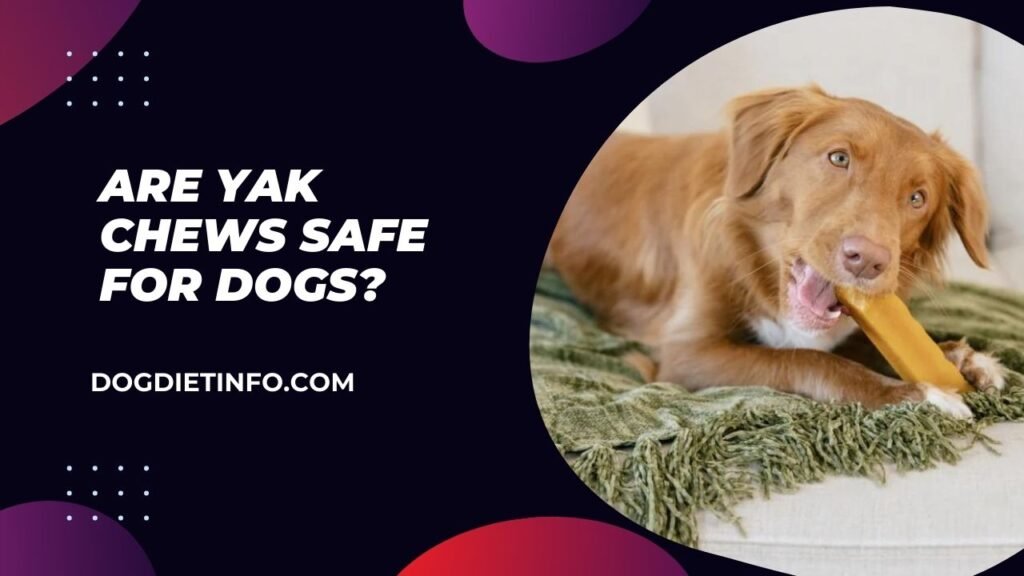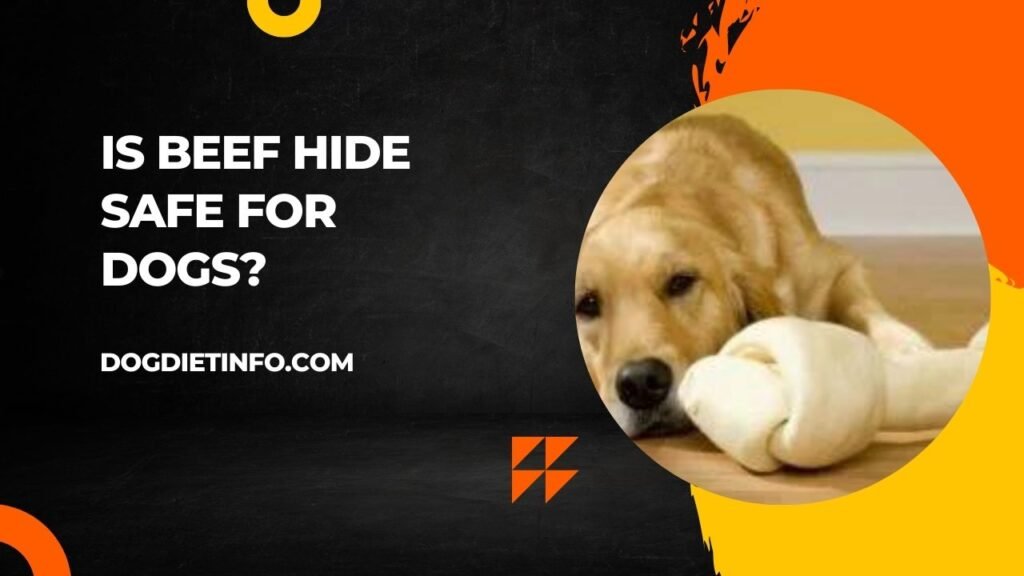Are Yak Chews Safe For Dogs? Yak chews are generally safe for dogs as they are made from natural ingredients like yak and cow milk.
Yak chews have become a favorite among dog owners looking for a natural, long-lasting treat that provides both entertainment and health benefits.
Made primarily from yak and cow milk, these chews boast a hard texture that helps clean a dog’s teeth while keeping them occupied for extended periods.
However, like any dog treat, it’s crucial to understand their safety profile and whether they are suitable for your dog.
This comprehensive guide will delve into the benefits, potential risks, and best practices for offering yak chews, ensuring you can make an informed decision for your furry friend.
Contents
What Are Yak Chews?
Ingredients and Origin
Yak chews, often called Himalayan yak chews, are crafted using a blend of yak and cow milk. These chews originated in the Himalayan region, where they were initially created as a human snack before becoming popular as a dog treat.
The ingredients are simple: yak milk, cow milk, a dash of salt, and a hint of lime juice. The simplicity of the ingredients makes these chews an excellent option for dog owners who prefer natural, additive-free products.
How They Are Made
The production process of yak chews is relatively straightforward but involves several steps to ensure the chews are hard, durable, and long-lasting.
First, the milk mixture is boiled and stirred continuously until it thickens. A small amount of salt and lime juice is added during this process to help solidify the mixture. The thickened milk is then poured into molds and pressed to remove excess moisture.
After this, the pressed chews are allowed to dry and harden naturally over several weeks, resulting in a dense, durable chew that can withstand a lot of gnawing.
This traditional production method ensures that yak chews are free from artificial preservatives, chemicals, and additives, making them a healthier choice compared to many commercially available dog treats.
Furthermore, their hard texture and high protein content make them an ideal option for dogs that enjoy chewing and need a treat that will last. [Are Yak Chews Safe For Dogs?]
Benefits of Yak Chews for Dogs
Natural and Nutrient-Rich
One of the most significant advantages of yak chews is their natural composition. Unlike many processed dog treats that contain artificial flavors, colors, and preservatives, yak chews are made from all-natural ingredients.
This makes them an excellent choice for pet owners who prioritize natural and wholesome foods for their dogs. [Are Yak Chews Safe For Dogs?]
Additionally, yak chews are high in protein, supporting muscle development, energy levels, and overall health in dogs.
The high protein content is especially beneficial for active and growing dogs who need adequate protein in their diet.
Dental Health Benefits
Dental health is a crucial aspect of a dog’s overall well-being. Poor oral hygiene can lead to plaque buildup, tartar, bad breath, gum disease, and even more severe health issues.
Yak chews help address these concerns naturally. The hard texture of these chews encourages dogs to gnaw and chew for extended periods, which helps in scraping away plaque and tartar from their teeth.
As a result, yak chews can be an effective tool for maintaining better oral hygiene and reducing the risk of periodontal disease. [Are Yak Chews Safe For Dogs?]
However, it’s essential to note that yak chews should not replace regular brushing and dental check-ups but can be a valuable addition to a dog’s oral care routine.
Long-Lasting Entertainment
Yak chews provide long-lasting entertainment for dogs, especially those with strong chewing instincts. Unlike softer chews that are quickly devoured, yak chews can take hours or even days to finish, depending on the size of the chew and the dog’s chewing habits.
This prolonged chewing not only satisfies a dog’s natural instincts but also provides mental stimulation, helping to prevent boredom and destructive behavior. [Are Yak Chews Safe For Dogs?]
For pet parents who need to keep their dogs occupied while they are busy or away from home, yak chews can be a great option to keep their pets entertained and happy.
Suitable for Dogs with Allergies
Food allergies are a common concern for many dogs, and finding a safe and suitable treat can be challenging.
Yak chews are typically low in allergens, making them suitable for dogs with certain food sensitivities or allergies.
Since they contain only natural ingredients and are free from common allergens such as grains, soy, and artificial additives, they are less likely to cause adverse reactions.
However, it’s always a good idea to introduce any new treat gradually and monitor for any signs of allergic reactions, such as itching, redness, or digestive upset.

Are Yak Chews Safe For Dogs?
Yak chews can be a safe and healthy treat for most dogs when used correctly. [Are Yak Chews Safe For Dogs?]
However, like any treat, there are potential risks that pet owners should be aware of to ensure their dog’s safety.
1. Choking Hazard
One of the primary concerns with yak chews is the risk of choking. As dogs chew on these hard treats, small, sharp pieces can break off, especially if the chew becomes too small or brittle.
These fragments can pose a choking hazard or cause blockages in the digestive tract if swallowed. To mitigate this risk, it is crucial to monitor your dog while they are chewing on a yak chew.
As the chew gets smaller, take it away to prevent the dog from swallowing it whole or attempting to gulp it down. [Are Yak Chews Safe For Dogs?]
Offering chews that are appropriately sized for your dog’s breed and chewing habits can also reduce the likelihood of choking.
2. Risk of Dental Damage
While the hardness of yak chews can help clean a dog’s teeth, it can also pose a risk of dental damage, particularly for aggressive chewers. If a dog bites down too hard on a yak chew, it could result in cracked or broken teeth.
Dental fractures can be painful and may require costly veterinary treatment.
To minimize this risk, choose a chew that matches your dog’s chewing style and avoid giving yak chews to dogs with a history of dental problems or those prone to chewing with excessive force.
For these dogs, softer alternatives may be more suitable. [Are Yak Chews Safe For Dogs?]
3. Digestive Concerns
Digestive issues can occur if a dog swallows large chunks of yak chew that it cannot properly digest. This can lead to gastrointestinal blockages, discomfort, or even the need for surgical intervention in severe cases.
Dogs with sensitive stomachs may also experience digestive upset if they consume too much of a yak chew.
To prevent these problems, ensure that the chew is appropriately sized for your dog and always supervise them during chewing sessions.
If you notice your dog attempting to swallow large pieces, remove the chew immediately. [Are Yak Chews Safe For Dogs?]
4. Caloric Considerations
While yak chews offer nutritional benefits, they are relatively high in calories. For dogs on a strict diet or those prone to weight gain, it’s important to account for the extra calories when incorporating yak chews into their routine.
Offering yak chews in moderation and balancing them with your dog’s regular diet can help maintain a healthy weight. [Are Yak Chews Safe For Dogs?]
Pet owners should always be mindful of the portion sizes and the overall caloric intake of their dogs, especially if they are using yak chews regularly.
How to Safely Give Yak Chews to Your Dog
Yak chews can be a great addition to your dog’s diet when given safely. Here are some best practices to ensure that your dog can enjoy these chews without any issues:
Selecting the Right Size
Choosing the correct size of yak chew is crucial to ensuring your dog’s safety. A chew that is too small can pose a choking risk, while one that is too large may be difficult for your dog to handle.
Always opt for a size that matches your dog’s breed and chewing habits. For example, small chews are suitable for small dogs, while larger chews are better suited for medium to large breeds.
Ensuring that the chew is appropriately sized will help minimize the risk of choking and dental damage. [Are Yak Chews Safe For Dogs?]
Supervise During Chewing
Supervision is key when offering any type of chew to your dog. Keep an eye on your dog while they are enjoying the yak chew to quickly intervene if they try to swallow large pieces or if the chew breaks into potentially dangerous fragments.
Supervision also allows you to gauge how your dog is handling the chew and whether it is an appropriate choice for them.
Monitor for Wear and Tear
Regularly inspect the yak chew for signs of wear and tear. If you notice any sharp edges, cracks, or small pieces breaking off, it’s time to replace the chew to prevent any injuries or choking hazards.
It’s also a good idea to discard the chew when it becomes too small to prevent your dog from swallowing it whole.
Limit Chewing Time
Limiting the chewing time can help prevent dental damage and digestive issues. Allow your dog to chew for a set period, such as 15-30 minutes, and then take the chew away.
This helps protect their teeth and prevents overconsumption. Rotating different types of chews can also provide variety and prevent your dog from becoming bored with a single type of treat.
Alternatives to Yak Chews
If you’re looking for alternatives to yak chews that offer similar benefits without the associated risks, consider the following options:
- Bully Sticks: Softer and more digestible, these are excellent for dogs that love to chew but are at risk of dental fractures. [Are Yak Chews Safe For Dogs?]
- Rubber Chew Toys: Durable and safe, these toys are ideal for aggressive chewers and can help satisfy their need to chew without risking dental damage.
- Rawhide Alternatives: Made from safer, digestible materials, they can be a good choice for dogs with dental concerns or those prone to swallowing large chunks.
Final Verdict
Yak chews can be a safe and beneficial treat for dogs when given with caution. Their natural ingredients, dental benefits, and long-lasting nature make them an attractive option for many pet owners.
However, potential risks like choking, dental damage, and digestive issues should not be overlooked. By choosing the right size, supervising your dog, and moderating their chewing time, you can provide a safe and enjoyable experience for your pet.
Always consult your veterinarian if you have any concerns about whether yak chews are suitable for your specific dog, especially if they have preexisting health conditions.
See Also: Are Chicken Hearts Good For Dogs?
FAQs
Are yak chews safe for teething puppies?
While generally safe, puppies have softer teeth and jaws, so it’s best to offer softer chews to prevent damage. Yak chews can be too hard for young puppies, so consult with your vet for safer alternatives.
How often can my dog have a yak chew?
Depending on your dog’s size, chewing habits, and diet, offering a yak chew once or twice a week is usually sufficient. Always balance treat consumption with your dog’s regular diet to maintain a healthy weight.
What should I do if my dog swallows a large chunk of a yak chew?
If this happens, monitor your dog for signs of distress such as choking, vomiting, or difficulty breathing. If they appear to be choking or in pain, contact your veterinarian immediately for guidance.
Are there any low-calorie yak chew options?
Some brands offer yak chews in smaller sizes or with added low-calorie ingredients, making them a better choice for dogs on a diet. Always check the nutritional information to select the best option for your pet.
Can yak chews cause allergies in some dogs?
While rare, some dogs might be allergic to dairy. If you notice any signs of an allergic reaction, such as itching, redness, or gastrointestinal upset, discontinue use and consult your vet.
Conclusion: Are Yak Chews Safe For Dogs?
Yak chews are a popular and natural treat that can provide numerous benefits for dogs, from satisfying their chewing instincts to promoting dental health.
However, like any chew, they come with potential risks that can be managed with proper precautions. [Are Yak Chews Safe For Dogs?]
By understanding the benefits and risks, choosing the right size, and supervising your dog while they chew, you can make an informed decision and ensure a safe and enjoyable treat experience for your dog.

Derrick Wilcox is a certified canine behaviorist with over 12 years of experience at Happy Paws Animal Clinic and Pawsitive Training Center, helping pet owners ensure safer, healthier, and happier lives for their dogs.



